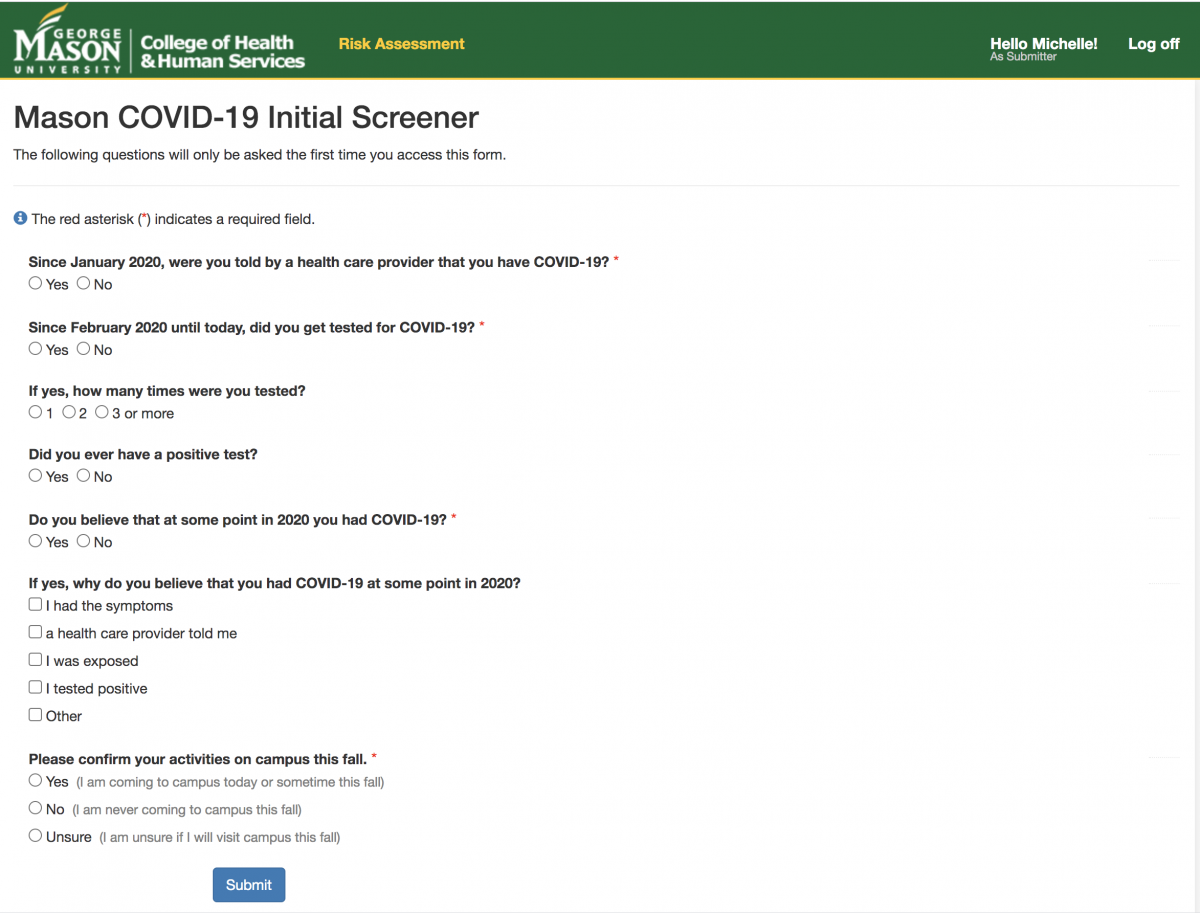Mason and other Virginia colleges adopt screening tool for real-time surveillance, early detection, and coordinated reporting of COVID-19.
Comprehensive COVID-19 screening, tracing, and rapid response capabilities are the foundation of reducing community spread of the virus and play a pivotal  role in safely resuming activities. To prepare for fall instruction, universities across the Commonwealth of Virginia will deploy the COVID Health Check™ a COVID-19 symptom and exposure tracking tool developed by a team at the George Mason College of Health and Human Services, led by Dr. Amira Roess, professor of global health and epidemiology.
role in safely resuming activities. To prepare for fall instruction, universities across the Commonwealth of Virginia will deploy the COVID Health Check™ a COVID-19 symptom and exposure tracking tool developed by a team at the George Mason College of Health and Human Services, led by Dr. Amira Roess, professor of global health and epidemiology.
Roess and collaborators were the first in the country to develop and launch a COVID-19 symptom and exposure tracker that collects real-time data, specifically to allow for rapid response. Roess and colleagues created the tool in March 2020, within days of the Centers for Disease Control and Prevention (CDC) declaring COVID-19 a global pandemic. The team from the College who collaborated on the original tool included: Dr. Rosemary Higgins, associate dean for research; Dr. Germaine Louis, dean; Dr. Cheryl Oetjen, associate professor of nursing; Dr. Carol Urban, associate dean for strategic initiatives and practice; and Dr. Janusz Wojtusiak, associate professor of Health Informatics and director of the Machine Learning and Inference Lab.
Since its launch at Mason, the tool has helped the University detect early cases by tracking symptoms and possible exposure to the virus. Members of Mason’s community complete an assessment of symptoms and exposure using the Health Check™, which provides a recommended course of action. Users also complete a Daily Symptoms Journal to provide on-going outbreak tracking which can help the university trace contacts when a member of the community test positive. Since the tool’s launch, more than 16,000 students, faculty, and staff have completed the assessment and more than 1,200 symptoms and exposures have been tracked.
Roess’s tool received great interest throughout Virginia and by June the Virginia Council of Presidents tapped Roess to lead efforts to share her team’s tool so that all Virginia universities can adopt Mason’s COVID Health Check™. Partners at The College of William and Mary’s Information Technology team worked with Roess to develop an interface to allow for rapid and large-scale adoption of Mason’s COVID Health Check™ across Virginia’s colleges.
Screening—as provided through the Health Check ™—is an essential first step to outbreak management. Without screening, early signs of  cases might go undetected leading to a high risk of widespread outbreaks and likely closures. Early screening is critical to prevent community spread. A holistic response strategy includes identification of early cases through symptom and exposure screening, quarantine of exposed individuals, testing, isolation of the case, contact tracing to identify contacts, and quarantine of cases.
cases might go undetected leading to a high risk of widespread outbreaks and likely closures. Early screening is critical to prevent community spread. A holistic response strategy includes identification of early cases through symptom and exposure screening, quarantine of exposed individuals, testing, isolation of the case, contact tracing to identify contacts, and quarantine of cases.
Health Check ™ is one component of Mason’s Safe Return to Campus testing protocol, which the College of Health and Human Services faculty helped develop with members of the Mason Student Health Services and Safety & Emergency Management teams. Prior to returning to campus, all students are asked to quarantine at home for 14 days and will take a COVID-19 test. Students will begin completing the Health Check ™ seven days prior to return and complete it each day. While on campus, students, faculty, staff, and visitors will wear face coverings and practice social distancing and good hand hygiene. On-site testing will be available, and the University will conduct randomized testing throughout the academic year to detect infections in asymptomatic individuals, as a part of its surveillance testing plan.
As a former epidemic intelligence officer for the CDC, Roess brings extensive experience in outbreak and emergency preparedness and response. She advises public and private organizations, including K-12, judicial systems, universities and businesses on how to safely resume operations. Roess also currently oversees several longitudinal studies to understand emergence and transmission of zoonotic infectious diseases globally, including the emergence and transmission of MERS-CoV (with support from the National Science Foundation), and COVID-19 antibody dynamics.
